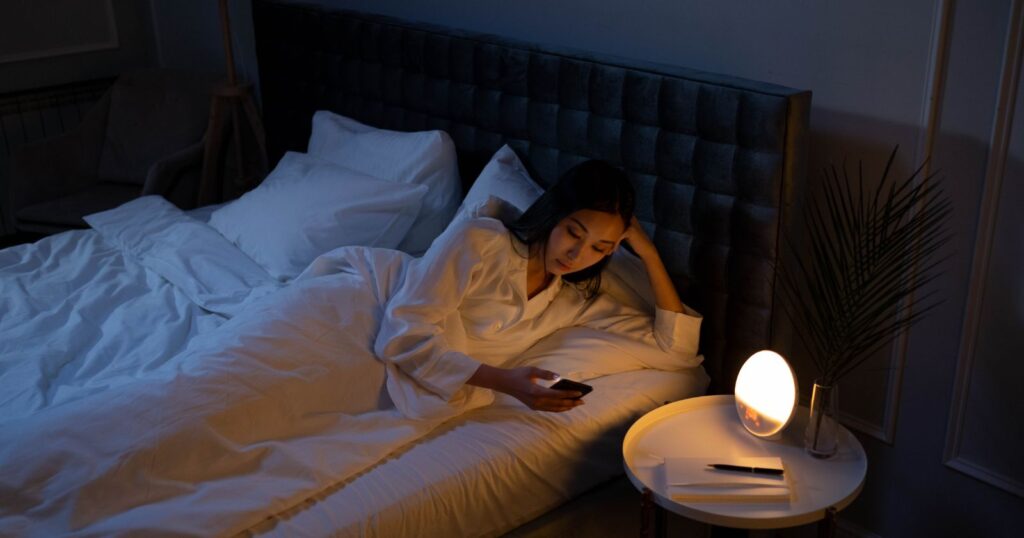Are you looking for ways how to overcome sleeplessness? Having trouble sleeping through the night is a common problem that many people deal with.
Lying awake for hours, unable to fall asleep, can make you feel exhausted and drained. Not getting enough quality sleep can lead to issues like poor concentration, moodiness, and even health problems down the road. The good news is there are ways to overcome sleeplessness.
In this article, we will delve into how to overcome sleeplessness, exploring the root causes and providing actionable steps to conquer those sleepless nights.
Let’s first understand why having proper sleep is important.
Why is Sleep Important?

Sleep is far more than a nightly pastime; your body and mind must work their best. When you’re sleep-deprived, your body struggles to heal itself, making you more likely to get sick.
Just as a vehicle requires regular maintenance to operate seamlessly, our bodies rely on sleep for essential physical and mental restoration.
Here’s why sleep is super important:
1. Nightly Renewal
Consider sleep a cellular reset button. As we drift into slumber, our bodies enter a profound state of renewal. Hormone production surges, fueling tissue growth and cellular regeneration. Strained muscles mend, and metabolic waste accumulated during waking hours is cleared away. This restorative process is indispensable for sustaining a vibrant, healthy physiology and preventing chronic ailments.
2. Sharpened Mind
While we slumber, our brains are far from dormant. Sleep plays a pivotal role in cognitive function. During this nocturnal symphony, memories are consolidated, transforming fleeting experiences into lasting recollections. Neural pathways are fortified, enhancing the circuitry underlying information processing. The result? Heightened focus, sharper thinking, and elevated problem-solving prowess upon waking.
3. Emotional Equilibrium
Sleep deprivation can unravel emotional stability. When deprived of sleep, our brains struggle to regulate emotions effectively. Irritability, anxiety, and even depression can ensue. Conversely, sufficient sleep nurtures emotional resilience. It cultivates equilibrium, enabling us to navigate life’s trials with greater poise.
4. Physical Strength
The link between sleep and physical vigor is irrefutable. Chronic sleep deficiency is a well-established risk factor for a constellation of health issues, including cardiovascular disease, stroke, diabetes, and obesity. Conversely, adequate sleep fortifies our immune defenses, enhancing our body’s capacity to combat pathogens and preserving our vitality.
But what actually triggers sleeplessness? Let’s find out.
What Triggers Sleeplessness?

Sleeplessness, also known as insomnia, can be triggered by a variety of factors including:
- Lifestyle Habits: Inconsistent sleep schedules, excessive screen time before bed, lack of exercise, or indulging in heavy meals or caffeine close to bedtime can disrupt your body’s natural sleep-wake cycle.
- Stress and Anxiety: Worries, anxieties, and emotional turmoil can keep your mind racing, making it difficult to switch off and drift off to sleep.
- Medical Conditions: Certain medical conditions like chronic pain, sleep apnea, hormonal imbalances, and depression can significantly impact sleep quality.
- Medications: Some medications can have side effects that interfere with sleep, such as causing restlessness or waking you up frequently.
- Environmental Factors: An uncomfortable sleep environment like an overly hot or cold room, excessive noise, or a bright bedroom can disrupt your sleep.
These are just some of the most common triggers. Lots of other things can mess with your sleep. Feeling stressed, anxious, or down can make it hard to drift off. Pain, allergies, or even hormonal changes can be sleep stealers too. Meds you take, caffeine, nightcaps (booze!), and staring at screens before bed can also be troublemakers.
How to Overcome Sleeplessness?

Millions struggle with sleeplessness but there are ways to fight back and reclaim those restful nights!
Here are some tips to help you overcome sleeplessness:
- Create a Relaxing Bedtime Routine: Wind down before bedtime with calming activities like reading, taking a warm bath, or gentle stretches. Put away your phone and other screens at least an hour before bed – the blue light they emit can mess with sleep.
- Become a Creature of Habit: Go to bed and wake up at the same time each day, even on weekends. This trains your body to know when it’s sleepy time.
- Make Your Bedroom a Sleep Sanctuary: Your bedroom should be cool, dark, and quiet. Blackout curtains, earplugs, and a comfy mattress can help. Think of your bedroom as a sleep and snuggle zone, not a place for work or electronics.
- Exercise Regularly: Exercise is great for sleep, but avoid intense workouts close to bedtime.
- Watch What You Eat and Drink: Limit caffeine and alcohol, especially in the afternoon and evening. Avoid heavy meals before bed, but don’t go hungry.
- Relaxation Techniques: Techniques like deep breathing, meditation, and progressive muscle relaxation can help calm your mind and body before sleep.
- Sunlight Exposure: Get some natural sunlight during the day. This helps regulate your body’s natural sleep-wake cycle.
Read more about personal development: Go to Homepage
If you continue to struggle with sleeplessness, seek help from your doctor. They can identify any underlying issues and recommend the right treatment approach.
Remember, good sleep is an investment in your overall health and happiness. So go forth and conquer those sleepless nights!
Sweet dreams!
